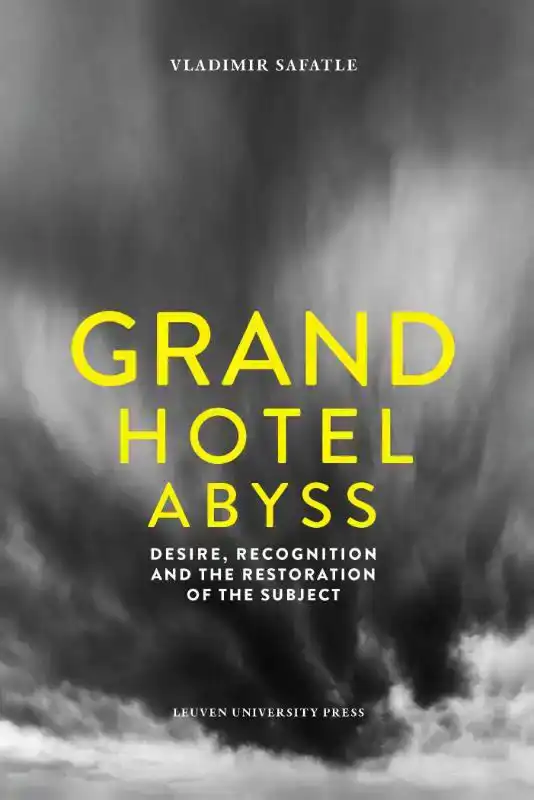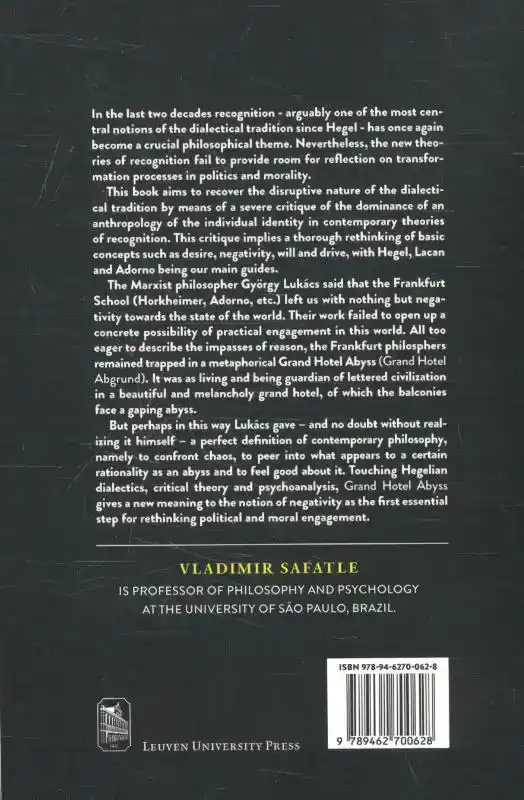- Engels
- Study
- social science
- psycho therapoëzie
- GRAND HOTEL ABYSS
SAFATLE, VLADIMIR
GRAND HOTEL ABYSS
55,00incl BTW
Vertrouwd sinds 1927
Persoonlijke aandacht en advies
Vanaf 17,50 gratis verzenden NL & BE
Meer dan 150.000 artikelen online
Omschrijving GRAND HOTEL ABYSS
Originally published in Portuguese as ''Grande Hotel Abismo''.
In the last two decades recognition - arguably one of the most central notions of the dialectical tradition since Hegel - has once again become a crucial philosophical theme. Neverthe
less, the new theories of recognition fail to provide room for reflection on transformation processes in politics and morality.
This book aims to recover the disruptive nature of the dialectical tradition by means of a severe critique of th
e dominance of an anthropology of the individual identity in contemporary theories of recognition. This critique implies a thorough rethinking of basic concepts such as desire, negativity, will and drive, with Hegel, Lacan and Adorno being our main g
uides.
The Marxist philosopher Gyorgy Lukacs said that the Frankfurt School (Horkheimer, Adorno, etc.) left us with nothing but negativity towards the state of the world. Their work failed to open up a concrete possibility of practical enga
gement in this world. All too eager to describe the impasses of reason, the Frankfurt philosphers remained trapped in a metaphorical Grand Hotel Abyss (Grand Hotel Abgrund). It was as living and being guardian of lettered civilization in a beautiful
and melancholy grand hotel, of which the balconies face a gaping abyss.
But perhaps in this way Lukacs gave - and no doubt without realizing it himself - a perfect definition of contemporary philosophy, namely to confront chaos, to peer int
o what appears to a certain rationality as an abyss and to feel good about it. Touching Hegelian dialectics, critical theory and psychoanalysis, Grand Hotel Abyss gives a new meaning to the notion of negativity as the first essential step for rethink
ing political and moral engagement.
In the last two decades recognition - arguably one of the most central notions of the dialectical tradition since Hegel - has once again become a crucial philosophical theme. Neverthe
less, the new theories of recognition fail to provide room for reflection on transformation processes in politics and morality.
This book aims to recover the disruptive nature of the dialectical tradition by means of a severe critique of th
e dominance of an anthropology of the individual identity in contemporary theories of recognition. This critique implies a thorough rethinking of basic concepts such as desire, negativity, will and drive, with Hegel, Lacan and Adorno being our main g
uides.
The Marxist philosopher Gyorgy Lukacs said that the Frankfurt School (Horkheimer, Adorno, etc.) left us with nothing but negativity towards the state of the world. Their work failed to open up a concrete possibility of practical enga
gement in this world. All too eager to describe the impasses of reason, the Frankfurt philosphers remained trapped in a metaphorical Grand Hotel Abyss (Grand Hotel Abgrund). It was as living and being guardian of lettered civilization in a beautiful
and melancholy grand hotel, of which the balconies face a gaping abyss.
But perhaps in this way Lukacs gave - and no doubt without realizing it himself - a perfect definition of contemporary philosophy, namely to confront chaos, to peer int
o what appears to a certain rationality as an abyss and to feel good about it. Touching Hegelian dialectics, critical theory and psychoanalysis, Grand Hotel Abyss gives a new meaning to the notion of negativity as the first essential step for rethink
ing political and moral engagement.
Specificaties
- MerkLeuven University Press
- GroepPSYCHOLOGIE ALGEMEEN(770)
- Barcode9789462700628
- LeverstatusActief
Reviews
0.0/5.0
Gemiddelde uit 0 reviews
Meest behulpzame reviews
Nog geen reviews geschreven




